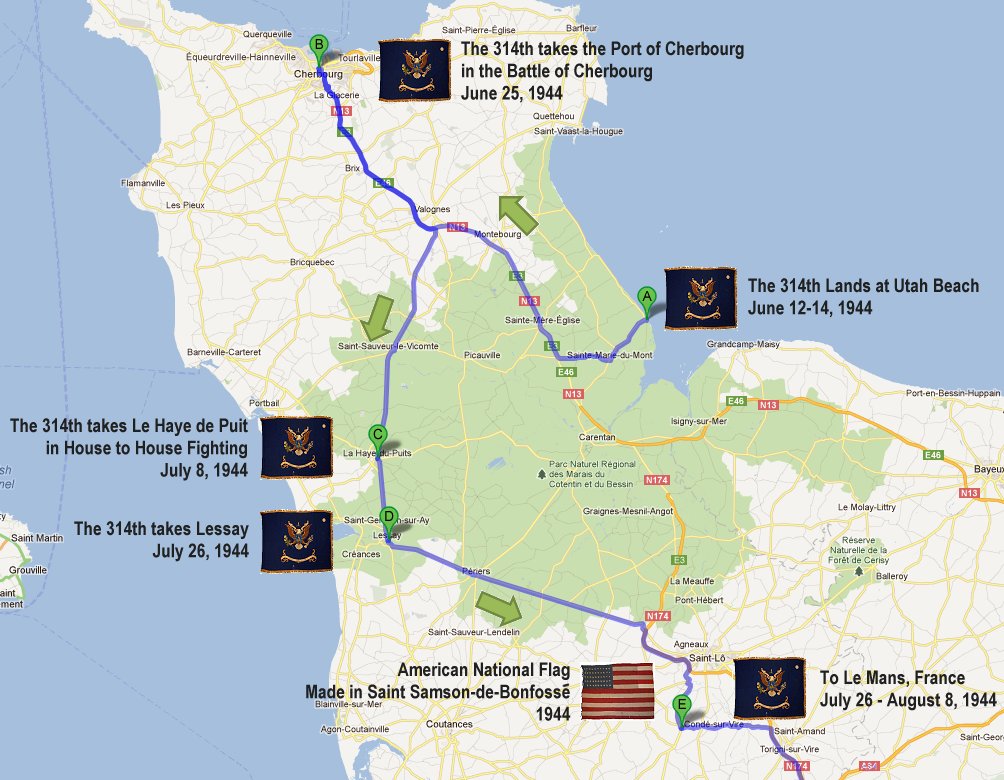|
These two flags are very
closely related in time, space and history, and they are
featured together for this reason.
This American Flag is one
of the few surviving World War II liberation flags which
were made primarily in France and Belgium during the
period of 1944-1945 to welcome American soldiers who
liberated France following the D-Day Invasion at
Normandy. This particular flag was made and found
in Saint-Samson-de-Bonfossé, which is a commune located
in the Manche District of Normandy, France, just 54
kilometers from Utah Beach. Even today, the main
street that runs through Saint-Samson-de-Bonfossé is
called Rue de la Libération, a constant reminder of the
momentous events of 1944. The liberation flag was
made to welcome the next flag in the Rare Flags
showcase, the battle flag of the 1st Battalion, 314th
Infantry Regiment, 79th Infantry Division. The
314th Infantry Regiment landed at Utah Beach, also in
the Manche District of Normandy, during Operation
Overlord from June 12-14, 1944. The regiment
fought in the Battle of Cherbourg, liberating the port
city of Cherbourg on June 20, 1944. Following the
battle of Cherbourg, the unit fought several engagements
in the Manche District, and ultimately continued to Le
Mans, France and on across Europe to Germany. The map
below gives an idea of how closely the flags and events
of the day are related. In fact, although further
research of the exact movements of the 1st Battalion,
314th Infantry Regiment would have to be examined, it's
quite possible that these two flags passed each other on
the street, perhaps along the Rue de la Libération in
Saint Samson-de-Bonfossé or in nearby Saint-Lô, as the
314th made its way south to Le Mans.

The two flags possibly meet in the vicinity of Saint
Samson-de-Bonfosse when the 1st Battalion,
314th Infantry Regiment, is en route to Le Mans, France,
in early August, 1944.
The liberation flag is
extremely folky, featuring an unusual star count of 49
stars. While it's likely that the maker knew that
the flag consisted of even rows of aligned stars, they
only produced 5 rows, rather than 6, which would have
made the correct 8 x 6 pattern of 48 stars. The
stars themselves are very unusual, made of large twine
that has been embroidered to the flag in the shape of
the stars. It is a unique and very beautiful way
of producing a star on the flag. It's apparent
that the flag was made from scarce materials at hand,
with several areas of the flag being pieced from
different cuts of fabric.
The battalion battle flag
of 1st Battalion, 314th Infantry Regiment, is also a
great rarity. The flag, at just over 50 inches
square, is smaller than a full regimental sized battle
flag, which tends to be larger, at more than 70 inches
square. The size of the flag, along with the small
circular patch, sewn to the top right corner of the flag
with an I in it, is clear indication that this is a
battalion battle flag for the 1st Battalion. The
eagle, crest and scrollwork of the flag are all
beautifully hand embroidered. The coat of arms for
the unit is embroidered over the chest area of the
eagle, consistent with the design of World War II era
battle flags, and differing from the design of the Model
1904 flags from the World War I era where the eagle's
chest is covered with the U.S. Shield emblem. The
flag's condition shows clear evidence of field use, and
without a doubt, was the flag that accompanied the 1st
battalion from its landing at Utah Beach in June, 1944,
across Europe to its eventual final mission occupying
the Dortmund, Sudetenland, and Bavarian regions of
Germany in 1945.
|

